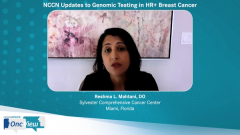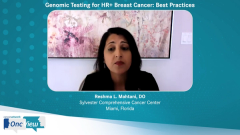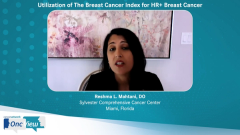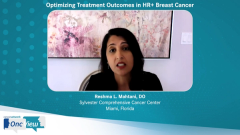
NCCN Updates to Genomic Testing in HR+ Breast Cancer
A review of recent updates to genomic testing guidelines by the National Comprehensive Cancer Network and important takeaways that impact treatment decisions for HR+ breast cancer in the extended adjuvant setting.
Episodes in this series

Kristie Kahl: What are genomic assays, and what is their current role in early stage breast cancer?
Reshma L. Mahtani, DO: Genomic assays aim to give us a more in-depth understanding of the biology of the individual’s tumor by looking at various levels of gene expression. The information can aid in further prognostication beyond clinical pathology factors alone. Most important, it can help us predict the benefit, or sometimes the lack of benefit, of our treatments, like chemotherapy and endocrine therapy. We’ve come a long way in the treatment of early stage breast cancer by incorporating various assays to help guide our decision-making and, most important, assist in helping patients be spared the toxicities of our treatments.
Kristie Kahl: Absolutely. How has the NCCN [National Comprehensive Cancer Network] updated its guidelines for the use of genomic assays for early stage disease? What is the significance of this shift in terminology?
Reshma L. Mahtani, DO: We’re fortunate to have several gene expression assays available to help guide us in the adjuvant setting. The NCCN Guidelines detail recommendations on the use of several of these, including the 21-gene assay, the 70-gene assay, Prosigna, as well as EndoPredict. The guidelines were updated to incorporate information from recently reported studies, such as RxPONDER as well as the 8-year data from the MINDACT trial. There was specifically a comment that we don’t know whether the benefit of chemotherapy that we’re seeing across some of these studies in younger patients is related to the possible chemotherapy-induced ovarian suppression. This will be an important area for us to clarify going forward in our younger patients. In terms of shifting the terminology as we talk about systemic therapies, now included is a discussion about extending adjuvant endocrine therapy and the endorsement of the Breast Cancer Index as an inclusion in the NCCN Guidelines update.
Kristie Kahl: How do the updated guidelines regarding the use of genomic assays affect the management of early stage hormone receptor–positive breast cancer in the extended adjuvant setting?
Reshma L. Mahtani, DO: The NCCN panel recently expanded the guidelines for breast cancer by recognizing the Breast Cancer Index as the only gene expression assay for prediction of benefit from extended endocrine therapy. This recommendation includes both node-negative and node-positive patients across antiestrogen therapies, including tamoxifen and aromatase inhibitors. This recommendation is based on various data sets that have validated the assay, which is also prognostic. The endorsement will hopefully publicize the value of the assay for clinicians who may not be aware of its availability.
Transcript edited for clarity.
Newsletter
Stay up to date on recent advances in the multidisciplinary approach to cancer.










































